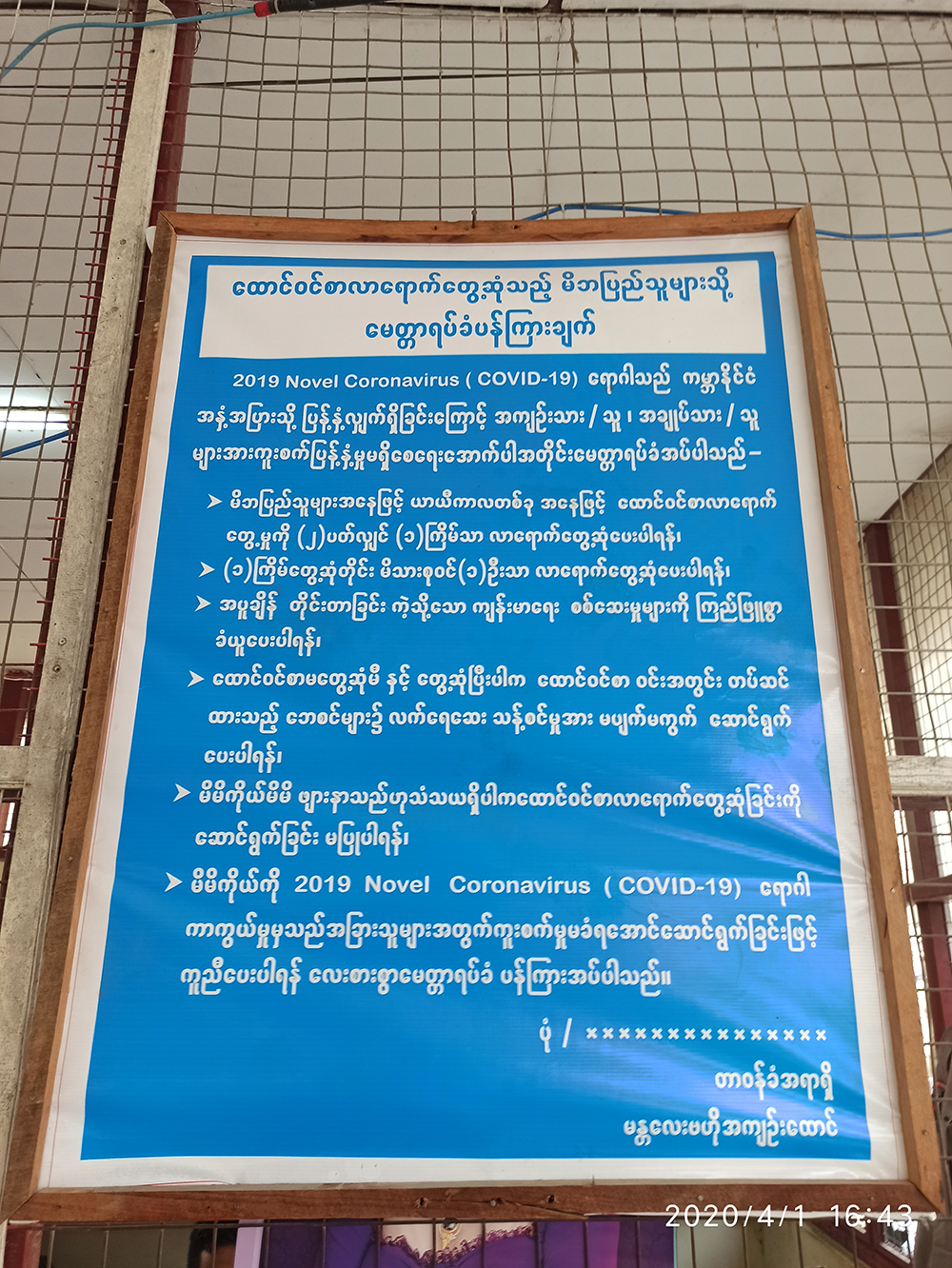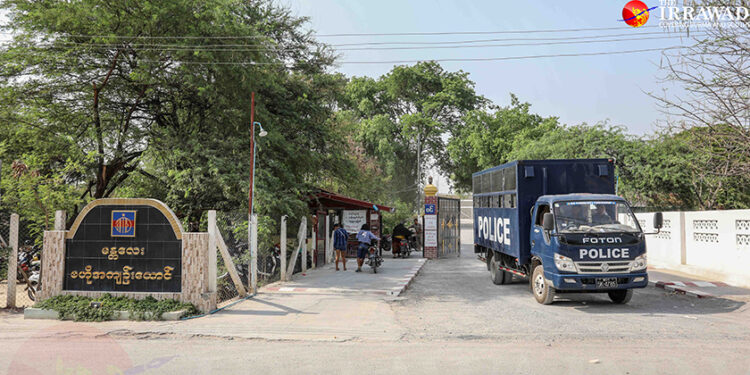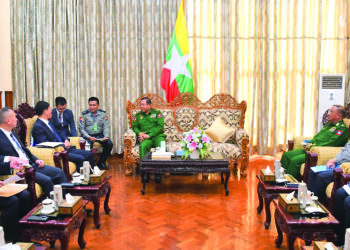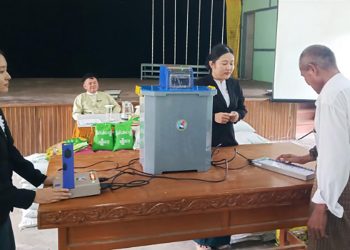MANDALAY—Rights groups in Myanmar have called for the release of prisoners who pose a low risk to public safety as fears grow of possible COVID-19 outbreaks in the country’s overcrowded prisons. The calls come as the number of fatalities from the disease rose to three on Wednesday with 22 total infections.
In a statement, more than 40 rights groups urged prison authorities and the government to adopt immediate additional measures to prevent the spread of the coronavirus in prisons and labor camps across the country. Among the groups signing the statement were the Drug Policy Advocacy Group, the Metta Development Foundation, Paung Gu, the Transnational Institute and Medecins Du Monde. Among other steps, they called for the release of low-risk offenders to reduce overcrowding.
“We call upon the Myanmar government and relevant departments and authorities to adopt immediate additional measures to prevent COVID-19 outbreaks in the country’s prisons, including the release of all prisoners with underlying medical conditions as well as those detained for non-violent offenses,” the statement reads.
The statement from local rights groups follows calls for the release of prisoners across Myanmar made earlier this month by Human Rights Watch (HRW) and the Assistance Association for Political Prisoners (AAPP).
The country’s 46 prisons and 50 labor camps have a maximum capacity of slightly more than 66,000 inmates. However, all of the facilities are currently overcrowded, housing nearly 100,000 prisoners and detainees, according to HRW.
Yangon’s Insein Prison has capacity for about 3,000 inmates but currently houses more than 10,000. Mandalay’s Obo Prison houses more than 8,000 prisoners and detainees—about four times the number it was designed to hold.
Citing the high risk of COVID-19 outbreaks in prisons, the groups said prisoners who represent a low risk to public safety—such as those above the age of 50 or under 18, and those suffering from TB, HIV, cancer, diabetes and other chronic diseases—should be released from all prisons, including labor camps, as a matter of priority. They also called for the release of people in pretrial detention, those detained for bailable offenses and those convicted of nonviolent crimes.
“Successive governments have made extensive use of presidential pardons. Under the current circumstances, the traditional New Year amnesty is, more than ever, crucially important. The risks of COVID-19 outbreaks in Myanmar prisons are real,” the statement adds.
The groups warned that the potential for outbreaks of COVID-19 could become a source of tension and unrest in prisons, as the pandemic threatens not only inmates, but also prison staff, their families and the local communities.
“Potential outbreaks of COVID-19 in Myanmar prisons directly threaten the health of thousands of inmates, prison personnel and their respective families. These could also result in deadly spillover of the virus into neighboring communities. Moreover, the greater vulnerability of prisoners to infection could rapidly lead to mounting tensions, unrest and security concerns within prisons,” the group warned.
Lawyer U Thein Than Oo, a rights activist and ex-political prisoner, agreed with the groups’ call, saying inmates incarcerated in overcrowded prisons across the country are most vulnerable to the novel coronavirus.
“If just one positive case was found in a prison, the outbreak would be uncontrollable. All institutions, including the government and the military, must think about this and should release as many prisoners as possible, as quickly as possible,” he said.
The lawyer said the government and all relevant authorities and institutions should cooperate on implementing an amnesty of prisoners in order to prevent unrest and outbreaks inside prisons.

“Normally, the government releases prisoners on Burmese New Year’s Day, especially those who have almost finished serving their prison terms or who have just a few months left. However, in this time of crisis, there could be unrest in the prisons, as those left behind will grow dissatisfied,” explained the lawyer.
“In my opinion, the government must cooperate with all relevant institutions to release all prisoners who do not pose a threat to public safety and all those in detention whose trials are ongoing,” he added.
The AAPP said prisons across the country are so overcrowded that the immediate release of inmates who pose a low risk to public safety is needed to reduce the risk of COVID-19 outbreaks.
“Prisoners who were sentenced for prostitution or drug abuse, prisoners who are sick, and prisoners who have served about half their sentences should be reviewed and released as soon as possible to reduce the prison population,” said Ko Bo Kyi of AAPP.
He urged the government to act quickly and include as many low-risk prisoners as possible.
To limit prisoners’ contact with the outside world, the Prisons Department has reportedly already instructed all prisons to allow only one family member to meet with each prisoner, once every 14 days. Visiting family members must also present health certificates from their respective township health authorities.
Visiting relatives must undergo body temperature screening and all those entering prisons must observe hand-washing regulations before meeting inmates. Disinfectant spraying has been carried out inside prisons across the country, according to an announcement from the Prisons Department in early April.
The department’s spokesperson could not be reached for comment.
The rights groups also called on the government to come up with a more comprehensive plan to combat COVID-19 in all detention facilities across the country, including those in conflict areas, and to enhance medical services for prisoners and prison staff.
The rights groups also called on international organizations and medical teams to provide assistance to prisons across the country in the form of medical equipment, medicine, disinfectants, protective equipment and medical care.
You may also like these stories:
Myanmar Reports Two More COVID-19 Deaths, Taking Toll to Three
Myanmar Military Doctors to Staff New Makeshift COVID-19 Hospital in Yangon

















